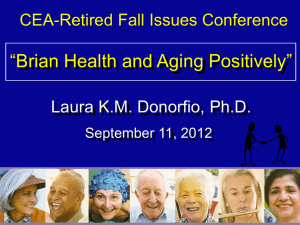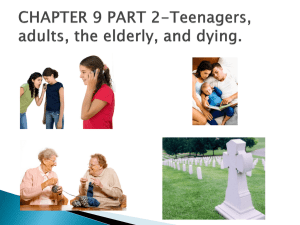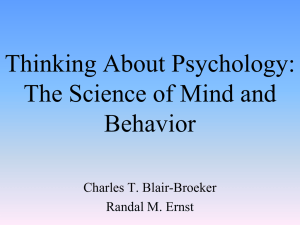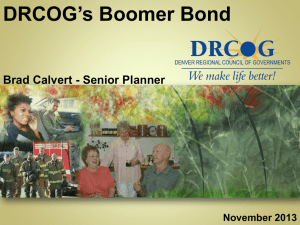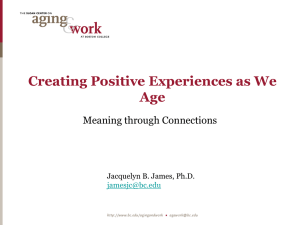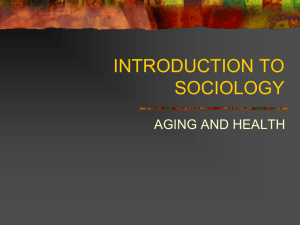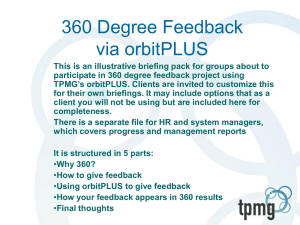Ethics at the End-of-Life
advertisement
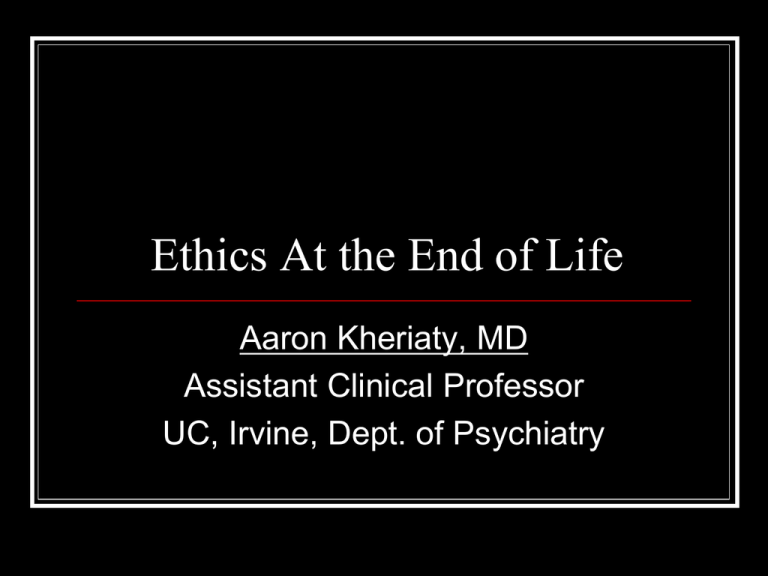
Ethics At the End of Life Aaron Kheriaty, MD Assistant Clinical Professor UC, Irvine, Dept. of Psychiatry Certain and Necessary… “As soon as a person is born, it must at once and necessarily be said: He will not escape death. Of all things in the world, only death is not uncertain.” -Augustine Objectives Social/Cultural Identify current social and cultural attitudes toward aging & dying Ethical Influence end-of-life decision making Explore ways to address patients’ fears and concerns during the final stages of life Outline foundational principles, values, virtues of medical ethics Application to difficult end-of-life decisions Clarify ethical distinctions that may inform medical care for end-of-life patients Aging, Death, Dying Current Social and Cultural Trends Aging Society: Demographics By 2050… 45 to 64 years old 65 and older more than double (34 to 79 million) 85 and older increase 40% (61 to 85 million) more than quadruple (4 to 18 million) We are on the verge of becoming a mass geriatric society (unique in human history) Cultural Trends: Modern Western Society American Individualism Autonomy, self-reliance Anti-aging industry Recent study: fears of aging highest in world’s wealthiest countries Technological control Power to alter circumstances of life External (environment) Internal (our self) Medical advances Cult of youth Longer lifespan Cures for acute illnesses Chronic illness & old age Distance from death Sanitized: out of home (1900) into hospital (2000) Facilitates “denial of death” (E. Becker, 1974) Psychological refusal to acknowledge mortality Medical language (e.g., patient “expired”) Demographic & Cultural Changes Taking Care: Ethical Caregiving in Our Aging Society Due to aging population President’s Council on Bioethics Looming crisis of dependency among elderly Response so far… Technological, number-crunching Programs for healthy aging Medical research for remedies (e.g., Alzheimer's) Taking Care “In so far as we do approach the topic of long-term care, we worry mainly about numbers and logistics: How many will need it? Who will provide it? How will we pay for it? The ethical questions of what the young owe the old, what the old owe the young, and what we all owe each other do not get mentioned.” -Leon Kass, Chairman Alzheimer’s: Illustrative Case Half of people over 85 will suffer some degree of dementia Alzheimer’s most common form Increasing incidence due to aging population Disease symbol of frightening burdens Old age and dying Fear of being dependent ourselves on others Fear of having others dependent on us Dependency and Disability In an Aging Society Dependence: Life History Common fear w/ aging Becoming a burden on others (dependence) Dependency undignified? Life always begins in dependence Preborn, newborn Young child Life often ends in dependence Old age and sickness Loss of capacities 1st Principle: Human dignity & personhood Not something we ‘have’ at some points in our life Remain persons with dignity throughout our whole life Dependency/Disability Not categorical E.g., like pregnancy Dimensional: Scale of disability on which all fall Matter of more or less Different periods of our lives, different points on scale When we pass from one point to another Remain same individual we were before making transition Do not lose our personhood, dignity, or basic rights Human dignity is given (not granted); can be respected, or violated Dependence: Modern Views Modern Psychiatry Typically understands dependence in pathological terms Dependent personality disorder “Co-dependent” couples Modern Philosophy Self sufficiency superior to dependency Moral philosophy emphasizes Individual autonomy Capacity for making independent choices But, emphasis is too one-sided Exaggerated Fears of Dependence in Old Age Failure to recognize Illusion of total control, complete autonomy Fostered by technological advances Individualistic cultural attitudes Extent of dependence throughout lifespan Devalue social ties, mutual solidarity Realities of aging population May help correct one-sided values Foster acceptance of care Encourage social solidarity Aging, Dependency, Disability Typically think of disabled as “Them,” as other than “us” Special class Separate “interest group” Disabled actually us As we have been As we sometimes are now As we may well be in the future Needs of the Disabled or Incapacitated We all lie on a scale of disability Interest in meeting needs not a “special interest” Interest of the whole society Interest in promoting the common good Even severely disabled are not “outsiders” But rather, weakest or most vulnerable members of our community Lessons to Learn from Aging/Dying What do dependent/disabled (e.g., Alzheimer’s) patients have to teach us? What it means for someone else To be wholly entrusted to our care Such that we are answerable for their well-being Caring for severely disabled: opportunity … Learn what we owe our own caregivers Role of proxy and advocate Speak for those who cannot speak for themselves Medical Ethics and End-of-Life Decisions Basic Principles End-of-Life Decisions: Anxiety Patients/family members often ambivalent Physicians sometimes uncertain what to do in borderline cases Case of conversion disorder in ER afraid of making wrong decision Provoked by anxiety of decision, cured by reassurance Sound ethical criteria can help guide us Foundational Ethical Principles Collective medical/moral wisdom… Should not directly aim at or intend death Sometimes, ethically justified to withhold or withdraw potentially life-extending medical treatments of healthy, sick, or already dying person Even though patient may consequently die more quickly Is this not aiming at or intending death? Key Distinction When we withhold/withdraw treatment Need not always do everything to insure longest possible life Aim to dispense with treatment, not with person’s life Wear helmets when playing soccer Not allow cars on the road Our decisions may hasten death (powers limited) Does not imply aiming at death Do not embrace death as good in itself Ethical Criteria: Withholding/Withdrawing When can person refuse potentially lifeprolonging treatment Without aiming at or intending death? When treatment judged to be Useless Futile: will likely not achieve intended results Excessively burdensome to the patient Little expected benefits, high burdens/risks Useless/Burdensome Treatments Ethical jargon: “extraordinary” (vs. ordinary) Refusing useless treatment Not choosing death, but choosing another sort of life Refusing excessively burdensome treatment or “disproportionate” (vs. proportionate) Not rejecting life as such, but life with added burdens of low-yield interventions Choosing not death, but one of several possible lives open to us Even if a foreshortened life Key Distinctions “Useless” or “burdensome” Refers to potential treatment or intervention Does not refer to value of patient’s life If I choose not to treat because I believe patient’s life is useless (e.g., to society) or burdensome (e.g., to her family) Then I reject not a treatment, but a life Ethically unacceptable Key Questions Right question… “How can I benefit the life this patient has?” Answer may be very little, medically Though much can be done psychologically and spiritually Wrong question… “Is is a benefit to have such a life?” Judgments here will be inescapably arbitrary and unjust Physicians not in a position to make such judgments Ordinary/Proportionate Treatment Not too painful, burdensome, expensive Ethically obligatory Reasonable chance of working Pt has right to this; duty not to reject it To refuse may imply suicidal intention Example: psychiatric consult Otherwise healthy young patient Refusing insulin injections Depressed, did not want to live (suicidal intent) Extraordinary/Disproportionate Excessively burdensome or useless Acceptance/refusal prudential decision For given patient in particular circumstances Can justifiably be withheld or withdrawn Does not imply doctor’s intention to kill or patient’s intention to die Ordinary/Extraordinary Judgment relative to Individual patient Particular circumstances Not just feature of treatment itself Same treatment can be proportionate in one circumstance, disproportionate in another E.g., dialysis Young ARF patient vs. end-stage cancer patient Food and Water (Nutrition and Hydration)? First If question… Medical treatment, or ordinary care? considered treatment, is it… Always ordinary? In some circumstances extraordinary? Useless? Excessively burdensome? Nutrition and Hydration: Treatment or Care? Treatment Medical Act Medications Surgery/Procedures Care Natural means for preserving life Shelter, Warmth Turning to avoid bedsores Cleaning wounds In most circumstances Food and water is natural means (care) Aim is nourishment and sustenance Aim is not alteration of disease process Artificially Administered Nutrition and Hydration Ethically: considered care even when delivered artificially (e.g., Dobhoff tube) End is the same: sustenance/nourishment Feeding Small bore synthetic catheters tubes not high-tech Simple to use, inexpensive, readily available Not new 1793, physician John Hunter tube fed patients who could not swallow Refusal of Food and Water: Ethical Considerations Circumstances where food and water do not attain proper end No longer provide nourishment and sustenance True of spoon-feeding or tube-feeding “Artificial” distinction irrelevant to moral criteria Useless or excessively burdensome Example: Patient in process of dying Organ systems failing No longer absorb food or assimilate nutrition ANH in Chronic Conditions (e.g., PVS) Presumption in favor of ANH if patient not actively dying Unless useless or burdensome Typically: ordinary care On par with clean sheets, warm room, bed care Not on par with medications, ventilator, dialysis, etc ANH not useless in PVS when achieves its end Nourishment Sustenance ANH not excessively burdensome in PVS If pt experienced this as burden, then pt would not be diagnosed PVS I am not advocating… …That extending life at all costs is always imperative …That human life must be preserved at whatever cost to other human goods …That a dying person should not be allowed to die …That we are obligated to use all extraordinary means to keep dying person alive I am advocating… …That we should never aim at or directly intend death of fellow human being whether by action or omission …That when we withhold or withdraw extraordinary treatments We aim to dispense with the treatment Because the treatment is useless or burdensome We do not aim to dispense with the patient’s life Because we judge the life to be useless or burdensome “Quality of Life” Considerations? Objection: decision to end patient’s life should be on the quality of her life Appeals to our empathy for patient Imagine ourselves living with her disability or in her circumstances This approach arises from legitimate fears Fear that a person will be brutalized by technology’s ability to sustain life Fear of living a life of prolonged suffering “Quality of Life”: Discriminatory From an outside perspective, impossible to judge the quality of life of another individual Introduces a discriminatory principle into the practice of medicine “This patient’s quality of life is too poor, so we are not going to treat her in the same way we would treat another patient” Introduces a eugenic principle into society Historical evidence: devastating consequences Quality of Life: Slippery Slope No universal standard to judge quality of life But judgments will eventually be determined by May start with altruistic motives Economic pressures (cannot be ignored) Political pressures (potentially disordered political system) Arbiters of “quality of life” Initially, patient, proxy, or physicians Eventually, those with economic interests Decision-making power open to abuses Eugenics: Recent History German psychiatrist Alfred Hoche (1920): paper advocating euthanizing severely disabled “Life Unworthy of Life” (Lebensunwertes Leben) Phrase commonly cited in pre-Nazi Weimar Republic Quality of life judgments dictated medical decisions Physician’s testimony Nuremburg trials revealed Principle eventually led to gross abuses and atrocities Medical experimentation Involuntary euthanasia of those deemed unfit Both in Weimar Republic and Nazi Germany Hippocratic Paradigm “Into whatever houses I may enter, I will come for the benefit of the sick…” -Hippocratic Oath Physicians: placed at service of the individual sick person Not an administrator of social resources or political programs Not an agent of state power/authority Mistake of Nazi physicians Physician Assisted Suicide, Euthanasia Intentionally causing death in order that suffering may be eliminated Sometimes proposed as solutions to burdens of caregiving, suffering, or prolonged illness Attempt at completely controlling death Irony: attempting to master very event that finally shows our lack of mastery Self-contradictory: exercising autonomy in order to eliminate autonomy Ethics and Human Goods Human life not merely instrumental good, but inherent good Not something we “have” or possess It is what we are: living being Our life is our person Without life, we can possess no other goods Precondition for all other human goods (grounding good) Including goods of autonomy, independence, rationality, etc. Human Life Life is a good Of the person Not just for the person To treat our life as a “thing” that we can authorize another to terminate is To contradict/destroy every other human good (including our autonomy!) Profoundly dehumanizing Summary Our task as physicians… When possible to cure Always to care Never to kill Legitimate Fears Rise of medical technology: mixed blessing People now fear they will be kept alive beyond what they can endure Basic distinction between ordinary and extraordinary care should be retained Otherwise will cross lines that lead to abuses and discrimination If we refuse to give basic care or ordinary treatment, Then we withhold things that every human person deserves Physicians Role in Addressing These Fears We do not live in a society where useless or burdensome care is typically refused Mentality: one more round of experimental chemotherapy Do not want to give up hope But we may unnecessarily subject people to useless “treatments” or excessive burdens Must educate our patients (or their surrogate) So that they can understand what they are accepting or rejecting Limited Wisdom of Advanced Directives Proponents initially: solution to difficult problems (panacea) Experience has proven otherwise Lessons learned Often ignored by physicians Good reasons Difficulty predicting complex medical circumstances Impossibility of imagining oneself in disabled state Advanced Directives: Limitations Best to keep to general principles & values Particular decisions best left up to surrogate (durable power of attorney) Surrogate ideally close relative/friend who understands patient Must work closely with physician, who does not abandon patient/surrogate during this time What We Learn We understandably want some control over life Limits to medical technology Attempts to completely control life and death can become dehumanizing Useless/burdensome “treatments” need not be attempted Never abandon care, even when cure is impossible Limits to human autonomy We are not sole author of story of our life We are dependent rational animals Aging and Dying “Against our confidence in mastery and control, we need to remember that old age and dying are not problems to be solved but human experiences that must be faced. In the years ahead, we will be judged as a people by our willingness to stand by one another, not only in the rare event of a natural disaster but also in the everyday care of those who gave us life and to whom we owe so much.” -Dr. Leon Kass, Washington Post article

